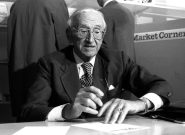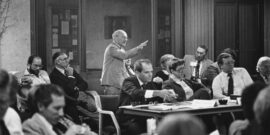Hayek was an originalist of a certain sort, one who favored an original meaning based on the words of the Constitution and the enactors' intent.
The 20th Anniversary of Hayek's Death
This past Friday was the 20th anniversary of the death of Friedrich Hayek. I can still remember the moment I learned of Hayek’s death, which occurred in my first of teaching.
Hayek is by far the most important intellectual influence on me. When I became persuaded of libertarian or classical liberal ideas, I read widely in the libertarian canon. While I was greatly influenced by Friedman, Nozick, Mises, and Rand, it was Hayek whose academic work inspired me most to undertake the decision to spend a lifetime learning about such matters. The first book I read by Hayek, The Constitution of Liberty, was a great introduction both to classical liberalism and to the history of political theory.
It is fitting on this anniversary to ask what were Hayek’s greatest contributions. Hayek lived a long life and was able to write in various fields, including writing two magnum opera (the Constitution of Liberty and Law, Legislation and Liberty). Different Hayek scholars, in different disciplines, may therefore have differing opinions about what his most important contributions were. In my opinion, these are the most important contributions that Hayek made.
1. The importance of local information in a wider order and the need to coordinate that information, including the central role that prices perform in coordinating actions in a market order.
2. The insight that the evolution of social practices over time, associated with traditional conservatism, and the market order, associated with classical liberalism, have deep connections and are compatible. When Hayek first wrote, these orders were thought of as opposites that necessarily conflicted. His insight (which was stolen without attribution by Irving Kristol if memory serves) paves the way for a principled fusionism or conservative libertarianism.
3. The development of the concept of a spontaneous order, which is associated with both historical or evolutionary orders and market orders.
4. The exploration of the character of law, including both the type of law that works best in a spontaneous order and the possible ways of generating such law.
Like many of the most important thinkers, Hayek’s insights were often not perfectly correct but were unbelievably useful. His discussion of the concept of a spontaneous order was very vague, but others have sought to define the concept more precisely. To my mind, his discussion of the character of law (point 4) is extremely interesting and useful, but I am no means convinced of many of his more specific claims about how law must be generated or about the content of a legal system.
Put differently, I often find myself disagreeing with major points that Hayek made, but at the same time building upon general Hayekian themes to support my case. For example, Hayek rejected consequentialism, but I am a two level consequentialist who supports his case for a conservative libertarianism based on the Hayekian themes of the benefits of tradition and liberty.
Hayek’s intellectual life was larger than life. Not only did he make incredible contributions, but his was a story of rise, fall and rise again. There is little in the academic world that compares with Hayek, after having been dismissed for nearly 40 years, winning the Nobel Prize in 1974 or having Margaret Thatcher, as Prime Minister, throw down the Constitution of Liberty onto a table at a cabinet meeting, and stating, “This is what we believe.”

